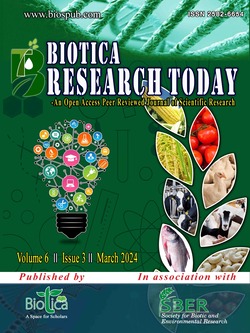
Application of Remote Sensing and GIS in Fisheries
Panchakarla Sedyaaw*
College of Fisheries, Ratnagiri, Maharashtra (415 629), India
Lanjewar N. Gourav
College of Fisheries, Ratnagiri, Maharashtra (415 629), India
Shweta A. Sonawane
College of Fisheries, Ratnagiri, Maharashtra (415 629), India
Pandey Ayushi
College of Fisheries, Ratnagiri, Maharashtra (415 629), India
Bhaviksinh K. Parmar
College of Fisheries, Ratnagiri, Maharashtra (415 629), India
DOI: NIL
Keywords: Assessment, Biodiversity, Fish, Stock
Abstract
The combination of Geographic Information System (GIS) and Remote Sensing (RS) technology marked the beginning in a new era in fisheries management by providing innovative answers to the challenges of conservation and sustainable resource use. This abstract explores the transformative impact of integrating these technologies in fisheries and their collective contribution to informed decision-making. Remote sensing technologies, encompassing satellite imagery and aerial surveys, have proven instrumental in monitoring and understanding marine ecosystems. Potential Fishing Zones (PFZs) represent a focused application within this integrated framework. This abstract highlights the capacity of these tools to provide timely and accurate information, fostering sustainable resource utilization and supporting the long-term health of marine ecosystems. As technological advancements continue, the collaborative application of RS and GIS stands as a cornerstone in the pursuit of a harmonious balance between meeting global demands for seafood and preserving the vitality of our oceans.
Downloads
not found
Reference
Dineshbabu, A.P., Thomas, S., Rohit, P., 2014. GIS-based spatial data analysis for marine fisheries management as a prerequisite for mariculture development. Fishing Chimes 33(10-11), 91-93. URL: http://eprints.cmfri.org.in/id/eprint/10020.
Meaden, G.J., Do Chi, T., 1996. Geographical information systems: Applications to marine fisheries. FAO Fisheries Technical Paper No. 356. FAO, Rome, Italy. p. 335. URL: https://www.fao.org/fishery/en/publication/46331.
Natteshan, N.V.S., Suresh Kumar, N., 2016. A survey of various methods of potential fishing zone identification. International Journal of Control Theory and Applications 9(40), 697-703.
Padua, S., 2018. GIS applications in aquatic environment. In: e-Training Manual on ‘Recent Advances in Marine Fisheries and Taxonomic Research in India’. ICAR-Central Marine Fisheries Research Institute, Kochi. pp. 1-3. URL: http://eprints.cmfri.org.in/id/eprint/12720.
Singh, Y.R., Mishra, S., Kantal, D., 2024. Application of genome sequencing in fisheries and aquaculture. Biotica Research Today 6(2), 67-69.
